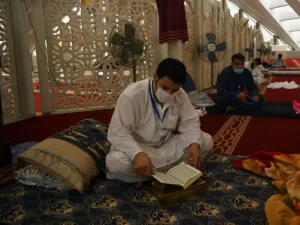In the heart of the Islamic faith lies a night so profound that its significance eclipses a thousand months. Known as Lailatul Qadr or the Night of Decree, it marks the occasion when the first verses of the Quran were revealed to Prophet Muhammad (peace be upon him) by the angel Gabriel. This night falls within the last ten days of holy month of fasting (Ramadan), is a time when the divine mercy, blessings and forgiveness are at their peak. Let’s explore the intricate tapestry of history, religious beliefs and spiritual practices that surround this auspicious night.
Historical Context of Qadr
The exact date of Lailatul Qadr is not definitively known, but it is widely believed to occur on one of the odd-numbered nights in the last ten days of Ramadan, with the 27th night being the most commonly observed. The Quran describes it as “better than a thousand months” (97:3), highlighting its unmatched value. The significance of Qadr is such that it is often described as the night that determines one’s fate for the coming year, with angels descending to Earth bringing peace and divine decrees.

Spiritual Significance
The Night of Decree is a time for intensified prayer, reflection and seeking forgiveness. Muslims believe that on this night, God’s mercy and blessings are abundant, sins are forgiven and prayers are accepted. It is a time to draw closer to God, reflect on one’s life and make amends. The emphasis on prayer, especially the Taraweeh and Tahajjud prayers, reciting the Quran and making supplications is paramount.
Rituals and Practices

During the last ten nights of Ramadan Muslims engage in a spiritual retreat called I’tikaf, spending time in mosques in prayer and Quranic study and seeking Lailatul Qadr. The practice of spending these nights in worship and contemplation is encouraged to maximize the chances of witnessing this holy night. Charity, another significant aspect of Ramadan is especially emphasized during these nights with believers encouraged to give generously.
Theological Perspectives
From a theological standpoint Lailatul Qadr reinforces the belief in predestination in Islam the concept of divine decree and the belief that everything that happens is according to God’s plan. It is a night when the decrees for the year are brought down to the earthly plane. This belief in divine decree does not negate free will but exists alongside it with humans responsible for their choices and actions.
Modern Observances
In contemporary times, Lailatul Qadr continues to be a night of great spiritual significance and communal prayer. Mosques around the world are filled with worshippers throughout the night, engaged in prayer and recitation of the Quran. The night also prompts Muslims to engage in acts of kindness and charity, reinforcing the bonds of community and humanity.
Reflection
Lailatul Qadr stands as a beacon of hope, mercy and forgiveness. It is a reminder of the power of prayer, the importance of reflection and the endless possibilities of divine grace. In the hustle of modern life, the Night of Decree offers a sacred pause, a time to reconnect with the divine and a chance to transform one’s life through prayer and contemplation.
In essence, Lailatul Qadr encapsulates the core values of Islamic faith, prayer, charity and forgiveness. It is a night that not only commemorates a pivotal moment in Islamic history but also offers every believer a chance to renew their faith, seek forgiveness and strive for a closer connection with the divine.
For more related content click here

